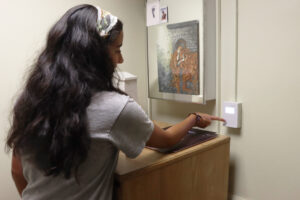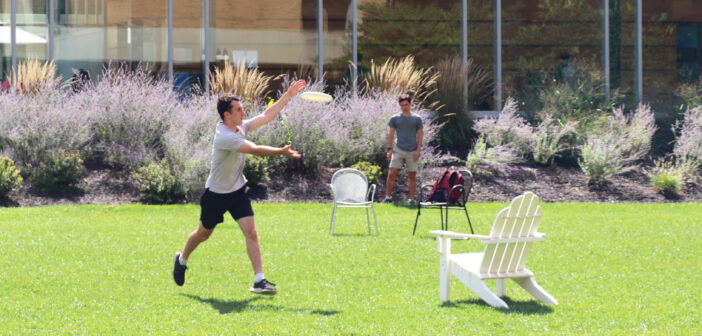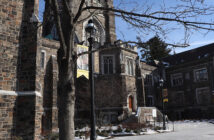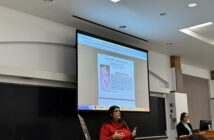A heat wave hit eastern Pennsylvania earlier this month. With temperatures reaching the high 90s, students were left to deal with uncomfortable conditions on campus.
According to Ready PA, a state-run resource providing information on emergency and disaster preparedness and recovery, a heat wave is a prolonged period of excessive heat — often combined with excessive humidity — for two or more consecutive days. The apparent temperature is also expected to be 100 degrees Fahrenheit or higher.
Heat waves can be measured by absolute values or percentiles, said Ben Felzer, earth and environmental sciences professor. He said these numbers can be compared to other numbers based on a normal climatic period of a given location — in this case, the data are in the 85th percentile above normal.
“When we think of heat waves, we think of how hot it gets during the day and don’t consider the temperatures during the night,” Felzer said. “But high temperatures overnight can lead to health concerns, too, especially for people who don’t have access to air conditioning.”
According to the U.S. Global Change Research Program, the most serious health impacts of a heat wave are often associated with high temperatures at night. If the temperature stays too warm at night, the human body faces extra strain as the heart pumps faster in an attempt to regulate body temperature.
According to the World Health Organization, this extra strain on the body typically includes heat exhaustion and heat stroke — a condition that causes faintness as well as dry, warm skin. Other symptoms include swelling in the limbs, cramps, headache, irritability and lethargy.
Felzer said while it is difficult to stay cool without air conditioning, using a fan and keeping your shades drawn during the day can help prevent excessive heat circulation.
Unless you are one of the 280 first-year students living in the McClintic-Marshall House, the only first-year dorm where every room has air conditioning, first-year students may deal with excess heat in their rooms.

Bianca Palomino, ’24, adjusts the thermostat in her dorm room in McClintic-Marshall House. McClintic-Marshall, commonly known as M&M, is a first-year residence hall that houses roughly 280 students. (Frances Mack/B&W Staff)
“Many of our first-year buildings were constructed in the 1940s-1970s, and air conditioning was not a consideration when the buildings were constructed,” wrote Ozzie Breiner, director of Lehigh housing services, in an email to the Brown and White. “Retrofitting older buildings with air conditioning, and the required project sequencing, is a key planning consideration as we look at our undergraduate housing capacity and inventory.”
He said that retrofitting air conditioning into first-year dorms would require the building to be unoccupied.
Students can only obtain a window unit if they submit a request through Housing Services, which requires an AC recommendation from a physician.
In fraternity and sorority housing, AC is permanently installed in six rooms of each house, but students living in the space must fill out an Air Conditioning Policy and Contract as well as provide a medical recommendation.
Sophia Schnakenberg, ‘26, lived in the Lower Centennial dorms her first year and found it difficult to live comfortably without air conditioning.
Though she left her windows open and a fan running at all times, Schnakenberg said she slept uncomfortably most nights and would spend little time in her room overall.
“It was so hot at the beginning of the year,” Schnakenberg said. “Other than (nights), I would go to my friend’s dorm which had air conditioning or just another building that had it.”
Schnakenberg said living in Hitch House this academic year is “amazing,” because she has air conditioning in her room and can now sleep peacefully, no longer waking up drenched in sweat.
Breiner wrote that the beginning of the school year is always a period of adjustment for students, as the heat during the first few weeks can make living uncomfortable.
He wrote most students bring window fans and make it through without too much difficulty, though Housing Services receives about 150 documented air conditioning requests per year.
Olivia Shafer, ‘27, currently lives in the Upper Centennial dorms without air conditioning.
She said it is hotter in her dorm than outside, even with fans running all day and night.
She said Upper Centennial’s common rooms have air conditioning but the humidity is still so prevalent that she does not like to spend time in those locations.
“(The heat) makes me dread coming back to the dorm,” Shafer said. “I don’t want to go to bed and have to sit in my sweat all night. It definitely makes me upset.”
This semester’s was different due to the heat wave, which Breiner wrote was “atypical” and “unusual” for this time of year.
“We did field some inquiries from students who thought they could manage medical conditions without a need for air conditioning, but the heat wave did result in a need for assistance with some window unit installation,” Breiner wrote.






Comment policy
Comments posted to The Brown and White website are reviewed by a moderator before being approved. Incendiary speech or harassing language, including comments targeted at individuals, may be deemed unacceptable and not published. Spam and other soliciting will also be declined.
The Brown and White also reserves the right to not publish entirely anonymous comments.